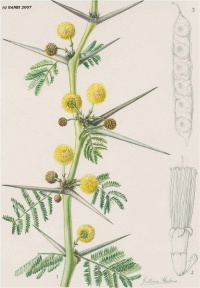Difference between revisions of "Acacia xanthophloea"
(→Alkaloid content) |
|||
| (5 intermediate revisions by one user not shown) | |||
| Line 1: | Line 1: | ||
== General Plant Info == | == General Plant Info == | ||
| + | |||
| + | [[File:Acacia-xanthophloea1.jpg|thumbnail|right|200px|alt=A botanical illustration of A. xanthophloea by J. Hulme (SANBI 2007).]] | ||
== Geographic distribution == | == Geographic distribution == | ||
| Line 5: | Line 7: | ||
'''Distribution:''' Native to southern and eastern Africa, including Botswana, Kenya, Malawi, Mozambique, Somalia, South Africa, Swaziland, Tanzania, Zambia and Zimbabwe. Naturalized in the USA and 3 trees are growing in S.E. Queensland, Australia. | '''Distribution:''' Native to southern and eastern Africa, including Botswana, Kenya, Malawi, Mozambique, Somalia, South Africa, Swaziland, Tanzania, Zambia and Zimbabwe. Naturalized in the USA and 3 trees are growing in S.E. Queensland, Australia. | ||
| − | '''Habitat:''' This species is found in low-lying areas in association with water. It grows in swampy areas, on the margins of lakes and pans and along river banks. It often forms dominant stands in seasonally flooded areas in alluvial soils | + | '''Habitat:''' This species is found in low-lying areas in association with water. It grows in swampy areas, on the margins of lakes and pans and along river banks. It often forms dominant stands in seasonally flooded areas in alluvial soils<ref>Smit 2008: 68</ref> |
== Identification == | == Identification == | ||
| − | '''Bark:''' The main stem of mature trees is smooth, with occasional irregular depressions and flaking, and is characteristically lime-green to greenish-yellow. Scars due to broken branches or other injuries are dark brown to black | + | '''Bark:''' The main stem of mature trees is smooth, with occasional irregular depressions and flaking, and is characteristically lime-green to greenish-yellow. Scars due to broken branches or other injuries are dark brown to black<ref>Smit 2008: 68-69</ref> |
| − | '''Spines:''' Straight, hairless and occur in pairs at nodes. Average length 40-85mm depending on age of tree | + | '''Spines:''' Straight, hairless and occur in pairs at nodes. Average length 40-85mm depending on age of tree<ref>Smit 2008: 69</ref> |
| − | '''Flowers:''' Globose flowering heads are borne at the nodes, mainly on previous seasons' shoots. They are bright yellow and 10-14mm in diameter | + | '''Flowers:''' Globose flowering heads are borne at the nodes, mainly on previous seasons' shoots. They are bright yellow and 10-14mm in diameter<ref>Smit 2008: 69</ref> |
| − | '''Seed pods:''' The indehiscent pods are straight and hairless, and often have marked constrictions between seeds. Young pods are green while dry pods are dark brown, breaking up transversely into segments after being shed. They attain a length of 30-75mm and a width of 7-14mm. Seeds are elliptic | + | '''Seed pods:''' The indehiscent pods are straight and hairless, and often have marked constrictions between seeds. Young pods are green while dry pods are dark brown, breaking up transversely into segments after being shed. They attain a length of 30-75mm and a width of 7-14mm. Seeds are elliptic<ref>Smit 2008: 69</ref> |
== Alkaloid content == | == Alkaloid content == | ||
| + | Our preliminary phytochemical analysis revealed the presence of anthraquinones, flavonoids, saponins, terpenoids and other alkaloids<ref>Nundkumar et al. 2002</ref> | ||
| − | + | The bark contains 17% condensed tannins<ref>Photochemistry of Acacia, Dept of Plant Biology, University of Illinois</ref> | |
| − | + | ||
== Extraction == | == Extraction == | ||
| Line 38: | Line 40: | ||
Smit, N. 2008, Field Guide to the Acacias of South Africa, Briza Publications, Pretoria. | Smit, N. 2008, Field Guide to the Acacias of South Africa, Briza Publications, Pretoria. | ||
| + | <references/> | ||
Latest revision as of 13:27, 26 August 2015
Contents
General Plant Info
Geographic distribution
Distribution: Native to southern and eastern Africa, including Botswana, Kenya, Malawi, Mozambique, Somalia, South Africa, Swaziland, Tanzania, Zambia and Zimbabwe. Naturalized in the USA and 3 trees are growing in S.E. Queensland, Australia.
Habitat: This species is found in low-lying areas in association with water. It grows in swampy areas, on the margins of lakes and pans and along river banks. It often forms dominant stands in seasonally flooded areas in alluvial soils[1]
Identification
Bark: The main stem of mature trees is smooth, with occasional irregular depressions and flaking, and is characteristically lime-green to greenish-yellow. Scars due to broken branches or other injuries are dark brown to black[2]
Spines: Straight, hairless and occur in pairs at nodes. Average length 40-85mm depending on age of tree[3]
Flowers: Globose flowering heads are borne at the nodes, mainly on previous seasons' shoots. They are bright yellow and 10-14mm in diameter[4]
Seed pods: The indehiscent pods are straight and hairless, and often have marked constrictions between seeds. Young pods are green while dry pods are dark brown, breaking up transversely into segments after being shed. They attain a length of 30-75mm and a width of 7-14mm. Seeds are elliptic[5]
Alkaloid content
Our preliminary phytochemical analysis revealed the presence of anthraquinones, flavonoids, saponins, terpenoids and other alkaloids[6]
The bark contains 17% condensed tannins[7]
Extraction
Other uses
Cultivation
Suppliers
Links
References
nen888 2012, Trying to improve Acacia information - Acacia xanthophloea. Available: [1] [2014, 04/12].
Nundkumar, N. & Ojewole, J.A.O. 2002, "Studies on the antiplasmodial properties of some South African medicinal plants used as antimalarial remedies in Zulu folk medicine", Methods and findings in experimental and clinical pharmacology, vol. 24, no. 7, pp. 397-402.
Smit, N. 2008, Field Guide to the Acacias of South Africa, Briza Publications, Pretoria.
